David Petersen's Blog, page 22
September 14, 2021
Celanawe Vs One Eyed Owl Commission/Sketchbook Piece
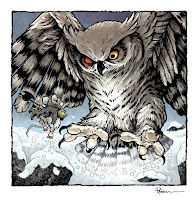 Last year and earlier this year I did an online event called OnlineCon where I opened up a list for inked commissions. It's not often that I offer fully inked commissions like this any more, but I was open to the idea of making fans happy in troubled times, supplement my income with conventions responsibly canceled, and to generate material for an upcoming Mouse Guard sketchbook.
Last year and earlier this year I did an online event called OnlineCon where I opened up a list for inked commissions. It's not often that I offer fully inked commissions like this any more, but I was open to the idea of making fans happy in troubled times, supplement my income with conventions responsibly canceled, and to generate material for an upcoming Mouse Guard sketchbook.To the left you can see one of those pieces finished and colored ready for a page in that sketchbook––and in this blogpost I'll break down the process to get there.
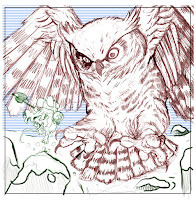 The request was to recreate the epic battle between Celanawe and the One-Eyed Owl from Winter 1152. The fan commissioning the piece asked that the owl be partially in flight. I drew the owl and Celanawe each separately on sheets of copy paper and then scanned them. With each drawing digitally tinted a different color I was able to easily see each figure as I moved, rotated, and resized them to create a composition. I digitally drew in some quick snow blanketed ground and rocks and toyed with the idea of horizontal lines to tone the background.
The request was to recreate the epic battle between Celanawe and the One-Eyed Owl from Winter 1152. The fan commissioning the piece asked that the owl be partially in flight. I drew the owl and Celanawe each separately on sheets of copy paper and then scanned them. With each drawing digitally tinted a different color I was able to easily see each figure as I moved, rotated, and resized them to create a composition. I digitally drew in some quick snow blanketed ground and rocks and toyed with the idea of horizontal lines to tone the background.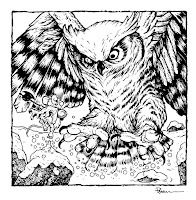
I printed out the above layout on copy paper and taped it to the back of a sheet of Strathmore 300 series bristol. On my Huion lightpad I can see through the surface of the bristol down to the printout to use as a guide as I ink. I used Copic Multiliner SP pens (the 0.7 & 0.3 nibs). I wanted the owl to have the most density of ink, while fading that off in the tail feathers as the snow is kicked up. I decided not to add the horizontal lines to the sky because I was worried it would compete with the owl and the overall composition..
When I had these inks finished, Julia shipped off the original art to the its new owner.
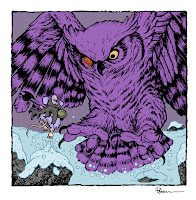 Before the art was shipped off though, I got a high-res scan of it so I could start the coloring process for this piece. That first step is called 'flatting' which is basically a professional task of coloring-in-the-lines and establishing what color area each thing in the piece is. The final color choices don't matter so much here, and to take the pressure off, I went with some garish choices just to get this step done.
Before the art was shipped off though, I got a high-res scan of it so I could start the coloring process for this piece. That first step is called 'flatting' which is basically a professional task of coloring-in-the-lines and establishing what color area each thing in the piece is. The final color choices don't matter so much here, and to take the pressure off, I went with some garish choices just to get this step done. I also took this step to establish color holds (areas where I want the black linework to be a color other than black) on all of the snow and the wounded eye.
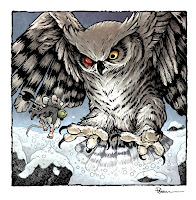
Here are the final colors all rendered and textured. I do most of this work only using two tools in Photoshop: Dodge and Burn. These are tools that date back to when Photoshop was a photo retouching tool and emulate part of the development process to over and under expose areas––ie: make areas darker and lighter. So with a stock textured brush I add shadows and highlights.This piece will eventually be collected with many more in an upcoming sketchbook I plan to release in early/mid 2022.
September 7, 2021
The Bearded Puemel
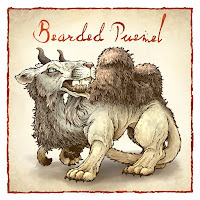 Last Friday on my Twitch Stream, we did the eighth community draw-along event #DrawTheExtinct where I posted an image from an old block print I made with a few animal photo inspiration prompts and the idea to create an imaginary extinct animal. I worked on my piece live on my Twitch stream while viewers worked at home and then on Monday we shared our finished pieces.
Last Friday on my Twitch Stream, we did the eighth community draw-along event #DrawTheExtinct where I posted an image from an old block print I made with a few animal photo inspiration prompts and the idea to create an imaginary extinct animal. I worked on my piece live on my Twitch stream while viewers worked at home and then on Monday we shared our finished pieces. Here is my finished Bearded Puemel. And below are my steps to create it as well as the community submissions.
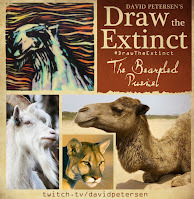
We started with the prompts of my original 2000's era linocut print titled 'Extinct' as well as a Camel, a Puma, & a Goat.
I told the viewers that they could use any combination of the inspiration prompts––they could make their version as cute and cuddly as a pocket pet stray kitten, as monstrous and deadly as a giant kaiju destroying cities, or anything in between. I also wanted this to be an excuse to get their pencils moving. I invited all skill levels, because I'm a firm believer that you shouldn't have to be good at something or pursuing mastery of it to just simply enjoy the act of it...and art is no exception.
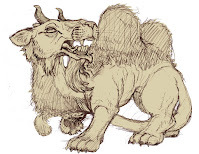
On the Friday stream I started drawing with mechanical pencil on a sheet of copy paper to try and reimagine the beast. I knew I wanted to keep it low to the ground so I started with the posture of a reclined camel, but then decided to go with puma legs instead, thinking the humps and face were communicating camel enough. I scanned it and did come digital manipulation to it in Photoshop to make the neck longer and upscale the head. I added a little tone to the overall silhouette to make sure it read as a shape the way I wanted.
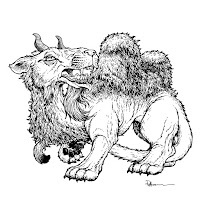
After I was happy enough with my above design, I printed that piece out on copy paper and taped it to the back of a sheet of Strathmore 300 series bristol. Using a lightpad, I was able to see through the surface of the bristol as I inked the Bearded Puemel. I used a Copic Multiliner 0.7 SP pen to ink the art. I was still streaming this portion on Twitch, though as my end of stream time was coming up, I knew I wasn't going to finish, so after I said goodbye to everyone watching and offered encouragement as they worked on their pieces over the weekend, I finished inking the humps off stream.
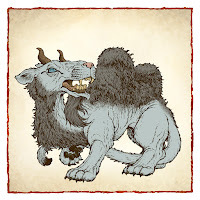 Once Julia and I had some dinner, I scanned the artwork into Photoshop to prep it for final color. First thing was to drop it into the template I have for #DrawTheExtinct pieces with the border & background already established. Then I started drawing in flat colors. This part of coloring (called flatting) is just a professional digital version of coloring-in-the-lines to establish the color areas.
Once Julia and I had some dinner, I scanned the artwork into Photoshop to prep it for final color. First thing was to drop it into the template I have for #DrawTheExtinct pieces with the border & background already established. Then I started drawing in flat colors. This part of coloring (called flatting) is just a professional digital version of coloring-in-the-lines to establish the color areas.These initial color choices were partly based on the blue-grey tones of the lino cut and I thought I'd use the goats tones for this fantastic beast. I added a color hold to the pupil of the ye so that I could play with it's color as well as to be able to render a highlight on it in the next step.
Below you can again see the final rendered colors (where I brought in more warmth and a transition shift from the puma legs to the goat/camel head) with a border and type applied in this final version.
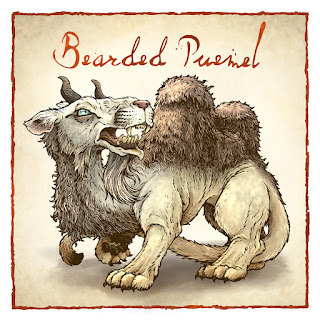
But, as this is a community event, I wanted to share all the other entries posted in the Discord. I awarded a prize and we voted together on a few more (prize winners marked with *) on Monday's Twitch stream and we all enjoyed seeing what each other had done. I hope we get even more participants next month (first Friday!)
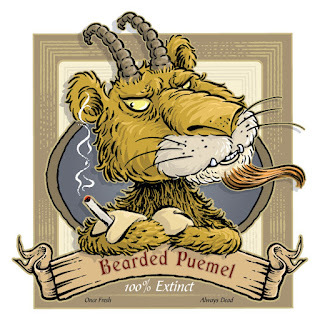 88UncleErnie*
88UncleErnie*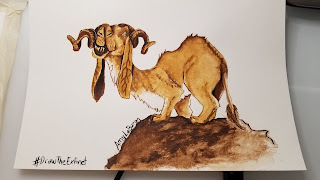 AmyLeBaron
AmyLeBaron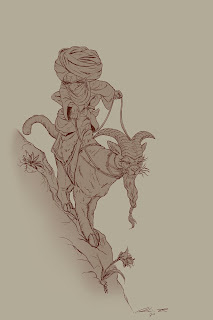 Bentu Estu*
Bentu Estu*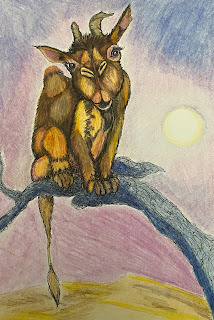 Capt.Nemo
Capt.Nemo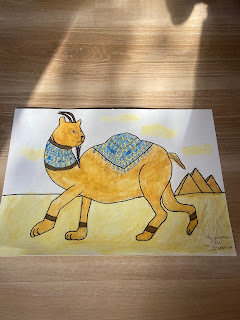 CjDj
CjDj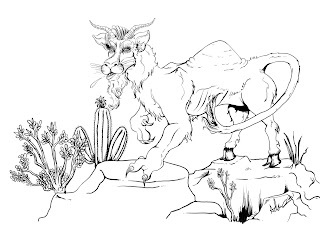 CosmicBard
CosmicBard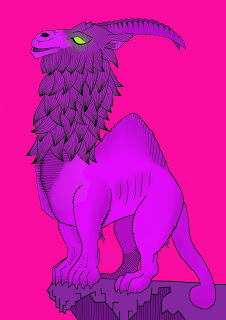 DePuggo
DePuggo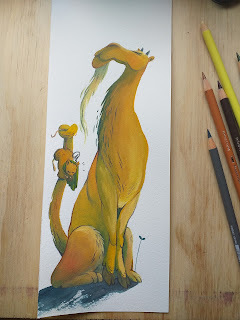 Dïne*
Dïne*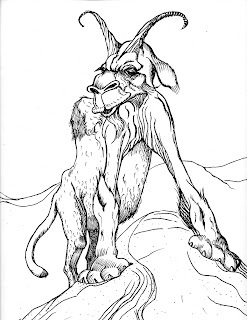 Doombot 2015
Doombot 2015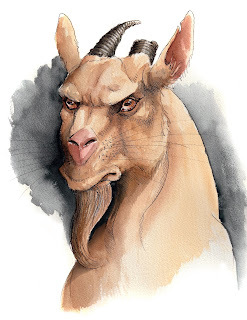 EvilCartoonist
EvilCartoonist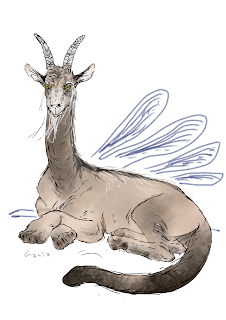 Gania
Gania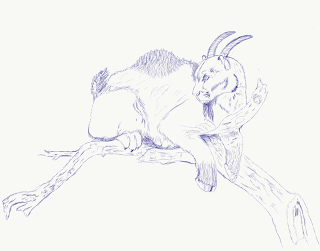 Itunpsicala
Itunpsicala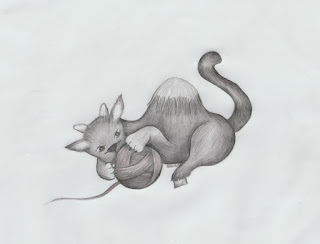 MarlieOnDiscord
MarlieOnDiscord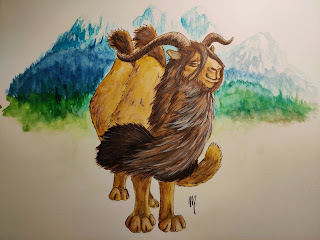 Naereniel
Naereniel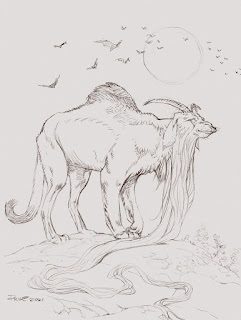 Nate Pride
Nate Pride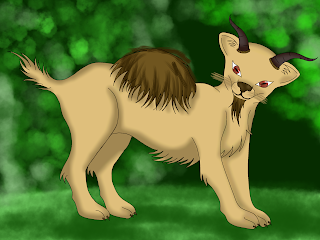 NekoVen
NekoVen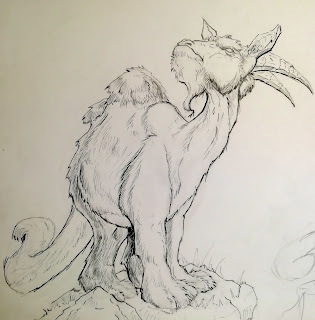 Nuvalo*
Nuvalo*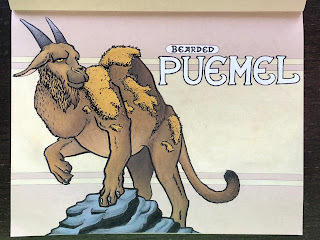 PaperbackRhino
PaperbackRhino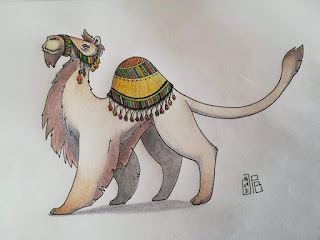 Pauline*
Pauline*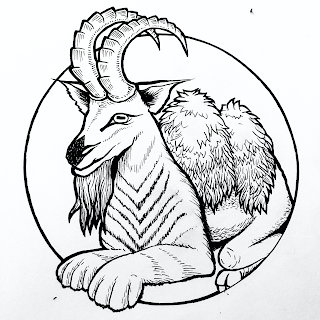 Pendrake
Pendrake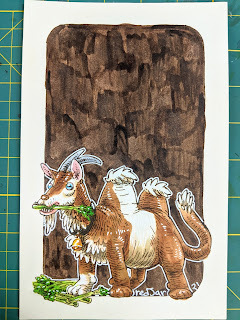 RedJarOJam*
RedJarOJam*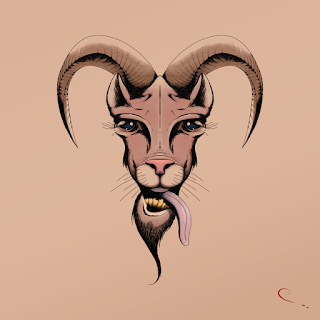 Sleepless Ninja
Sleepless Ninja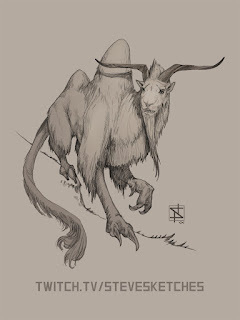 Steve Sketches
Steve Sketches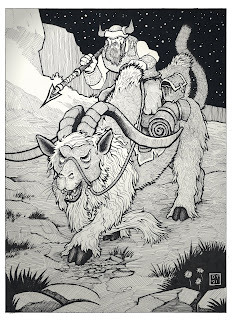 Tyberius
Tyberius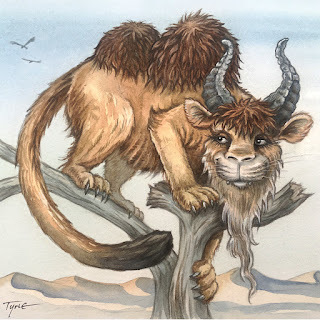 Tyrie
Tyrie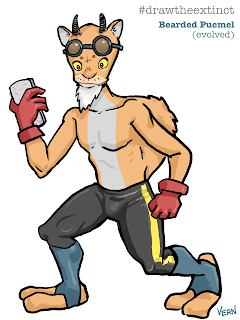 VernNYC
VernNYC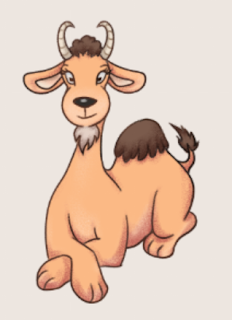 VeryBlueberry
VeryBlueberry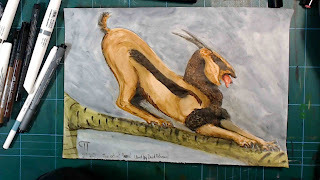 XHunter
XHunter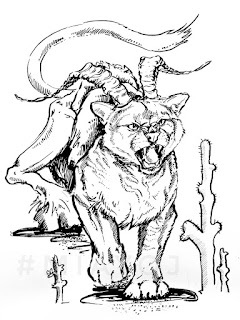 YojMia
YojMia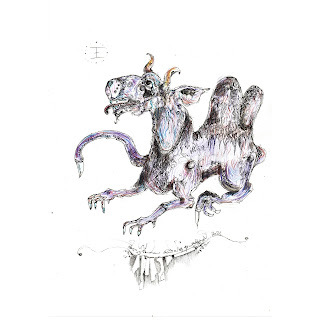
Бельфегор
August 31, 2021
Usagi Yojimbo Dragon Bellow Cover 5
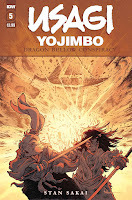 I was fortunate enough to be asked by IDW and Stan Sakai to do a run of covers on the new Usagi Yojimbo reprints of 'The Dragon Bellow Conspiracy'. I'll be doing six in total, and for this blogpost I'll be sharing my process for the creation of the cover art for issue #5.
I was fortunate enough to be asked by IDW and Stan Sakai to do a run of covers on the new Usagi Yojimbo reprints of 'The Dragon Bellow Conspiracy'. I'll be doing six in total, and for this blogpost I'll be sharing my process for the creation of the cover art for issue #5.This issue is currently up for pre-order through Diamond with the code AUG210595. Just ask your local comic shop to order it for you, or order it though an online retailer. The issue will be in shops October 20, 2021
To the left you can see the finished cover, but below I'll go through the steps in creating it.
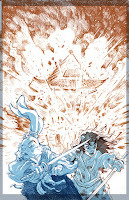 Layout/Pencils
Layout/PencilsBack in 1988 when this story was originally printed in black and white, Stan Sakai drew the covers for the series. For most of my covers so far, I've relied on what he thought was important enough from that issue's story to be the focus of each cover. But for #5, I decided to go off on my own. I worried about the spoiler nature of the imagery (there's a massive explosion at the castle that Usagi & Tomoe survive). I drew the explosion on one sheet of copy paper (thinking of the plumes of smoke I'd draw on my Plotmasters Claw piece) and the forms of Usagi & Tomoe I drew each separately on other sheets of copy paper. I scanned them all, and assembled them getting to resize and make adjustments to each element until I liked the overall composition. Tinting each part helped me see the forms. I also blocked in the severe shadows I would later use color to imply.
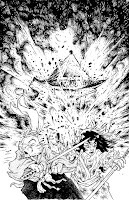 Inks:
Inks:When the above layout was approved by the editor and Stan, I started the inks. First step was to print the layout file onto copy paper (over two sheets that had to be taped together at the seam) and tape that to the back of a sheet of Strathmore 300 bristol. On my Huion lightpad I was able to ink the cover art using the printout as my pencils lines. This way in the end the inked artwork is very crisp and clean with no need to erase pencils lines. I used Copic Multiliner SP pens to ink the art (the 0.7 and 0.3 nibs).
The majority of the inking process was all of the rolling smoke while inking around the negative shapes of the blast forces.
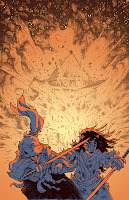 Color Flats:
Color Flats:The inks were approved and I scanned them in to Photoshop to start the coloring process. This first part of coloring digitally is called 'flatting' and is a professional version of coloring inside the lines. Establishing what each area's color is and where it ends. This not only is a color base for the image, but also allows a quick flat color area to be able to quickly isolate to render or make adjustments on.
I used a gradient fill on the background, some orange for each character, & a blue violet for those shadows. I went through and established color holds (areas where I want the inkwork to be a color other than black) on the castle & explosion, as well as Usagi's eye scar.
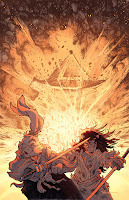 Final Colors:
Final Colors:Here again is the finished art (this time sans-logo). I made significant changes to the tones from the flats by adjusting color balance, brightness, & contrast. To render all of the color I mostly used the Dodge and Burn tools (Photoshop tools based on real photography techniques for purposely over or under exposing film as it develops). Burn is do darken and Dodge is to lighten. I use a stock Photoshop textured brush as I add shadows and highlights with these tools so the work looks a little more organic and less digital.
It's an honor to be asked by Stan to do these covers and to get his approvals as I work through each cover.
Usagi Yojimbo: The Dragon Bellow Conspiracy #5 is out in stores October 20, 2021
August 24, 2021
King Fisher & Guardmouse
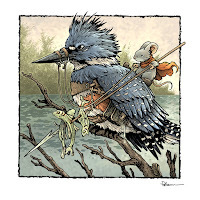
Earlier during this year's ONLINECON I took a few inked commissions. I don't tend to do these any more because of how much added work they are compared to my toned commissions. But, they are something many fans still ask for, and if they are mouse-themed, I can color them for my own use for later publication in a sketchbook.
To the left are the finished colors of one of those commissions (one I will eventually collect in the next Mouse Guard sketchbook). And below I'll run through the art process of creating the art.
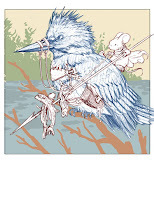
The layout/pencils for this piece started as just an earnest drawing of a belted Kingfisher. I looked at a few photos for reference as I worked. The fan's request was that a Guardmouse would be spear fishing while rinding on the back of the bird. So, atop a lightpad on a second sheet of copy paper placed over the King Fisher pencils, I drew the Guardmouse and all the gear associated with fishing and riding a mount.
I then scanned the two drawings and assembled them in Photoshop and blocked in a rough landscape with a quick digital painting.
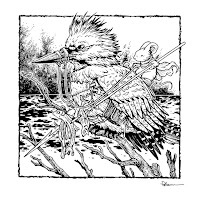 I printed out the above digital composition and taped it to the back of a sheet of 12" x 12" Strathmore bristol 300 series. On my Huion lightpad, I'm able to see the printout and I can use it as my 'pencil' lines as I ink. This way, at the end of the inking process, there are no actual pencils to erase and the artwork is as clean as I can possibly make it for the commissioner.
I printed out the above digital composition and taped it to the back of a sheet of 12" x 12" Strathmore bristol 300 series. On my Huion lightpad, I'm able to see the printout and I can use it as my 'pencil' lines as I ink. This way, at the end of the inking process, there are no actual pencils to erase and the artwork is as clean as I can possibly make it for the commissioner. I inked the lines with Copic Multiliner SP pens (the 0.7 and 0.3 nibs mainly). The background was all inked while leaving a white gap between it and the foreground/character lines. This helps add some depth, but also with the next part of the coloring stage.
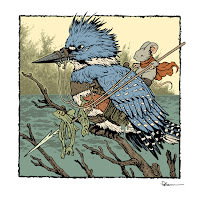
Then the inks were scanned before Julia shipped off the original art to its new home. With the high-res scan, I could start the digital coloring process to be able to use it later for publication. This process starts with establishing where all the colors go––like a digital professional job of coloring-in-the-lines. I also used this step to paint in all my color holds (areas where I want the inkwork to be a color other than black) like the background trees and the water. Leaving the gap between the inks for the foreground and background made isolating those colorholds easier.
My next sketchbook won't release until 2022, but this piece is already a guaranteed page in the publication.
August 17, 2021
Ballad of the Ivory Lass Reinterpreted by Very Handsome Billy
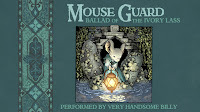
During the 2021 OnlineCon Twitch music streamer veryhandsomebilly reinterpreted the Mouse Guard song 'Ballad of the Ivory Lass' with as one of his chill vibe funk live-learns.
Link to Billy's Twitch Stream: https://www.twitch.tv/veryhandsomebilly
Watch the performance on YouTube:https://youtu.be/ApIG0ASM9Mk
The Ballad of the Ivory Lass appeared in Winter 1152 issue/chapter 4. I talk about the writing of that song, what it's narrative purpose was, and about Jesse Glenn providing the melody as a framework all in a Creator Commentary video: https://youtu.be/zVw9YRnbG5U
To listen to the original recording of Ballad of the Ivory Lass performed by Jesse Glenn, you can download the free MP3 here: http://www.mouseguard.net/wp-content/uploads/2012/04/mgballad.mp3
August 10, 2021
The Mustela Leopiger
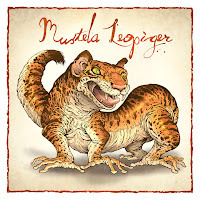 Last Friday on my Twitch Stream, we did the eighth community draw-along event #DrawTheExtinct where I posted an image from an old block print I made with a few animal photo inspiration prompts and the idea to create an imaginary extinct animal. I worked on my piece live on my Twitch stream while viewers worked at home and then on Monday we shared our finished pieces.
Last Friday on my Twitch Stream, we did the eighth community draw-along event #DrawTheExtinct where I posted an image from an old block print I made with a few animal photo inspiration prompts and the idea to create an imaginary extinct animal. I worked on my piece live on my Twitch stream while viewers worked at home and then on Monday we shared our finished pieces. Here is my finished Mustela Leopiger. And below are my steps to create it as well as the community submissions.
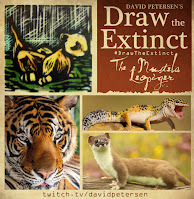 We started with the prompts of my original 2000's era linocut print titled 'Extinct' as well as a Leopard Gecko, a Tiger, and a Weasel.
We started with the prompts of my original 2000's era linocut print titled 'Extinct' as well as a Leopard Gecko, a Tiger, and a Weasel.I told the viewers that they could use any combination of the inspiration prompts––they could make their version as cute and cuddly as a pocket pet stray kitten, as monstrous and deadly as a giant kaiju destroying cities, or anything in between. I also wanted this to be an excuse to get their pencils moving. I invited all skill levels, because I'm a firm believer that you shouldn't have to be good at something or pursuing mastery of it to just simply enjoy the act of it...and art is no exception.
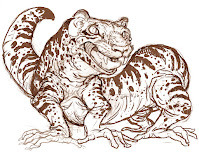 On the Friday stream I started drawing with mechanical pencil on a sheet of copy paper to try and reimagine the beast. It was a tough job to combine all three parts. The Body shape of the Weasel & Gecko are so similar, that then you are either choosing one of their body details or other others. I went with the ears and tufted tail to represent the weasel. Even after I had a drawing I liked most of on paper, I scanned it and dis come digital manipulation to it in Photoshop to fix proportions and scale before also deciding to finish out the drawing stage digitally with my tablet.
On the Friday stream I started drawing with mechanical pencil on a sheet of copy paper to try and reimagine the beast. It was a tough job to combine all three parts. The Body shape of the Weasel & Gecko are so similar, that then you are either choosing one of their body details or other others. I went with the ears and tufted tail to represent the weasel. Even after I had a drawing I liked most of on paper, I scanned it and dis come digital manipulation to it in Photoshop to fix proportions and scale before also deciding to finish out the drawing stage digitally with my tablet.
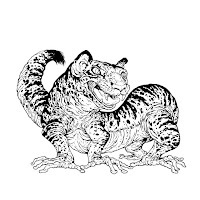
After I was happy enough with my above design, I printed that piece out on copy paper and taped it to the back of a sheet of Strathmore 300 series bristol. Using a lightpad, I was able to see through the surface of the bristol as I inked the Mustela Leopiger. I used a Copic Multiliner 0.7 SP pen to ink the art. I was still streaming this portion on Twitch, though as my end of stream time was coming up, I was nervous I wouldn't finish in time. Turned out, I went a little over-time to get the inks completely finished before I said goodbye to everyone watching and offered encouragement as they worked on their pieces over the weekend.
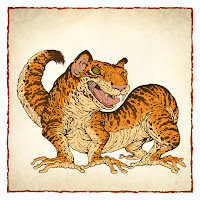 Off stream I scanned the artwork into Photoshop to prep it for final color. First thing was to drop it into the template I have for #DrawTheExtinct pieces with the border, background, and a base shadow already established. Then I started drawing in flat colors. This part of coloring (called flatting) is just a professional digital version of coloring-in-the-lines to establish the color areas.
Off stream I scanned the artwork into Photoshop to prep it for final color. First thing was to drop it into the template I have for #DrawTheExtinct pieces with the border, background, and a base shadow already established. Then I started drawing in flat colors. This part of coloring (called flatting) is just a professional digital version of coloring-in-the-lines to establish the color areas.My color choices were essentially going with the tiger's orange and the underbelly of the Gecko and Weasel fur. I did play with blue vs green eyes before settling on green. I also had a lot of work in establishing color holds for all the spot/striped markings.
Below you can again see the final rendered colors with a border and type applied in this final version.
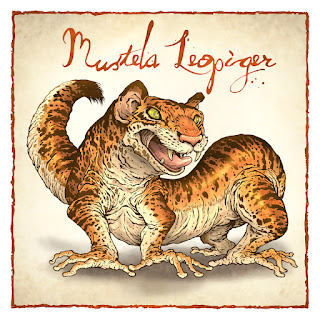
But, as this is a community event, I wanted to share all the other entries posted in the Discord. I awarded a prize and we voted together on a few more (prize winners marked with *) on Monday's Twitch stream and we all enjoyed seeing what each other had done. I hope we get even more participants next month (first Friday!)
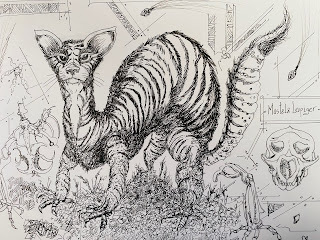 Capt.Nemo*
Capt.Nemo*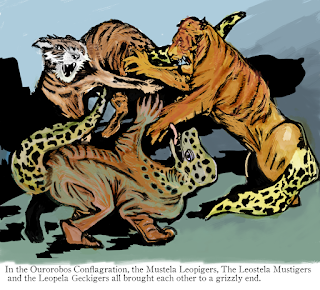 Cortrah
Cortrah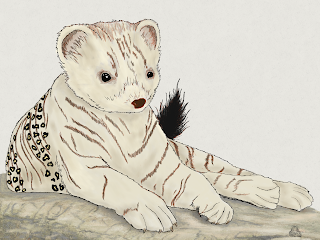 Dark
Dark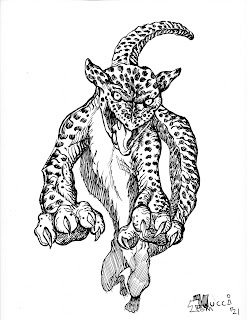 Doombot2015
Doombot2015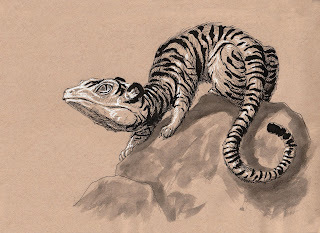 EvilCartoonist*
EvilCartoonist*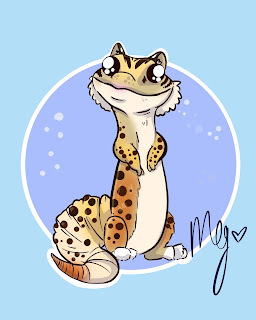 MegsMashables*
MegsMashables*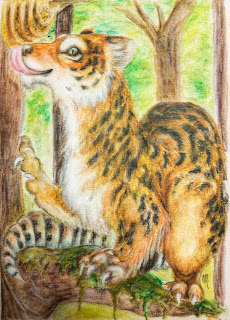 Naereniel
Naereniel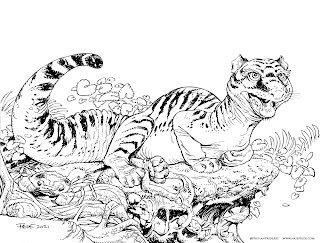 Nathan Pride*
Nathan Pride*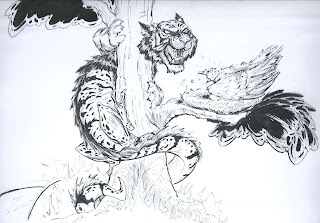 Nuvalo
Nuvalo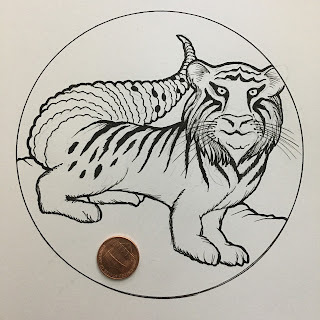 Pendrake
Pendrake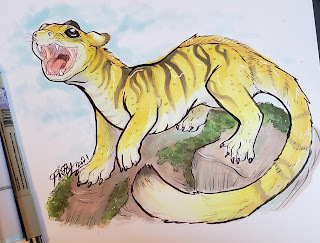 Ratty Creations
Ratty Creations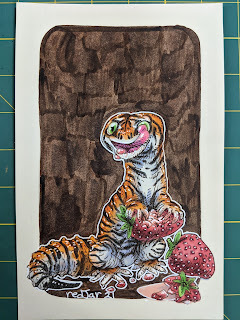 RedJarOJam
RedJarOJam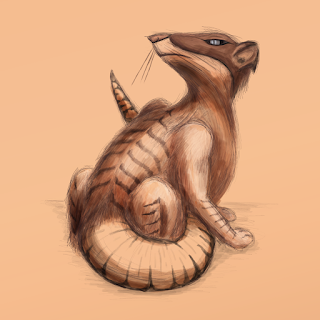 sleepless.ninja
sleepless.ninja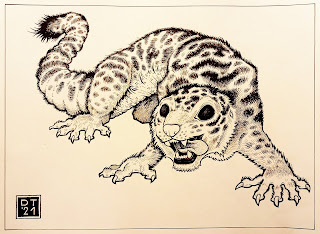 Tyberius*
Tyberius*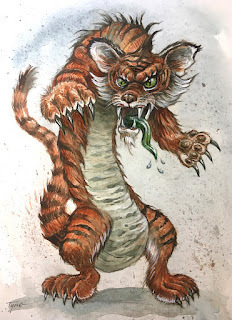 Tyrie
Tyrie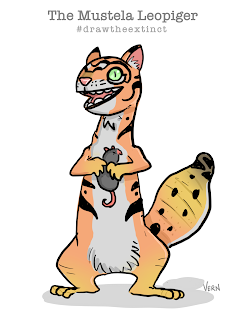 VernNYC
VernNYC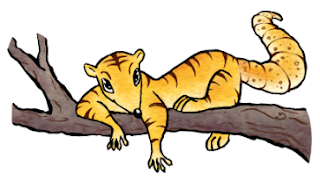 VeryBlueberry2
VeryBlueberry2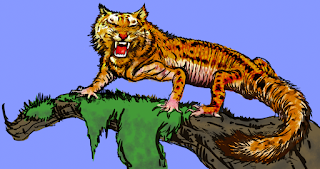 Kevin Owen
Kevin Owen
August 3, 2021
Chameleon Guard Patrol
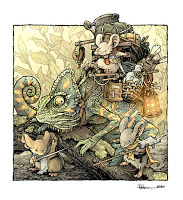
During OnlineCon last year and this year, I took on several inked commissions. The idea was 1) to make some fans happy (since I rarely offer these types of pieces any more) 2) Earn some income in the heights of the pandemic, and 3) build several pieces of work that I could color for an upcoming Mouse Guard sketchbook.
To the left you can see one of those pieces finished and colored ready for a page in that sketchbook––and in this blogpost I'll break down the process to get there.
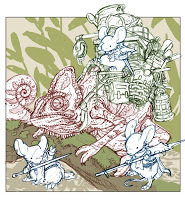
The commission request was from longtime fan Kyle Wright who asked for a patrol of Guardmice using a Chameleon as a pack animal loaded up with gear & supplies. Somewhere in the process, I got confused about chameleon species and drew a hooded chameleon instead of a panther chameleon like Kyle asked for (apologies, Kyle.) I drew the chameleon on one sheet of copy paper, and then on a light pad, used another sheet of paper to draw all the gear (this way if I needed to erase or adjust the items, I didn't risk destroying the original drawing. I then drew the three Guardmice on a third sheet of paper, and scanned all three sheets into Photoshop where I could composite them and add in some quick digital painting for the landscape.
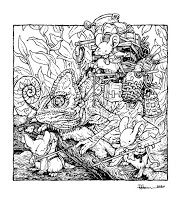
I printed out the above 8"x 8"layout on copy paper and taped it to the back of a sheet of 12" x 12" Strathmore 300 series bristol. On my Huion lightpad I can see through the surface of the bristol down to the printout to use as a guide as I ink. I used Copic Multiliner SP pens (the 0.7 & 0.3 nibs). Getting the details of the Chameleon right without over-inking the details was the hard part. I knew the ink coverage would get dense in all the gear, so I used more restraint on the lizard. And in that same way I used a much lighter touch with the background foliage knowing it would help imply some depth & distance. With the inks done, the piece was sent off to Kyle.
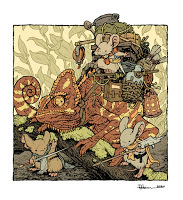 Before Julia shipped off the original, I got a good scan of the art so I could start the coloring process. That first step is called 'flatting' which is basically a professional task of coloring-in-the-lines and establishing what color area each thing in the piece is. I'd played with the idea of going a little crazy with the colors (going more into the range of a panther chameleon's range rather than sticking to what I drew) but started with a russet look for the lizard knowing that I could alter it as I worked.
Before Julia shipped off the original, I got a good scan of the art so I could start the coloring process. That first step is called 'flatting' which is basically a professional task of coloring-in-the-lines and establishing what color area each thing in the piece is. I'd played with the idea of going a little crazy with the colors (going more into the range of a panther chameleon's range rather than sticking to what I drew) but started with a russet look for the lizard knowing that I could alter it as I worked.I also took this step to establish a color hold (an area where I want the black linework to be a color other than black) on the background leaves to help push them back and add a sense of depth. I also added a few color holds to the chameleon's spots, details on the gear, and a glow on the lantern.
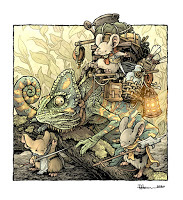
This piece will eventually be collected with many more in an upcoming sketchbook I plan to release in early/mid 2022.
July 27, 2021
Usagi Yojimbo Dragon Bellow Cover 4
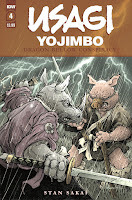 I was fortunate enough to be asked by IDW and Stan Sakai to do a run of covers on the new Usagi Yojimbo reprints of 'The Dragon Bellow Conspiracy'. I'll be doing six in total, and for this blogpost I'll be sharing my process for the creation of the cover art for issue #4.
I was fortunate enough to be asked by IDW and Stan Sakai to do a run of covers on the new Usagi Yojimbo reprints of 'The Dragon Bellow Conspiracy'. I'll be doing six in total, and for this blogpost I'll be sharing my process for the creation of the cover art for issue #4.This issue is currently up for pre-order through Diamond with the code JUL210507. Just ask your local comic shop to order it for you, or order it though an online retailer. The issue will be in shops September 29, 2021To the left you can see the finished cover, but below I'll go through the steps in creating it.
Layout/Pencils
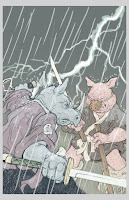 This issue features a really great duel between Gen the Rhinoceros Bounty Hunter and Zato-Ino the blind pig. It's a seminole moment in the Usagi series, so it was my obvious choice for the cover. I'd drawn Gen once before as a commission for a fan, but this was my first time drawing either character for something to be published. I drew each character on separate sheets of copy paper, scanned them in and cobbled together a composition. Photoshop allows me to move, resize, and rotate each character (or limbs & swords if I isolate certain parts of each drawing)––and in this cover that was helpful due to the problem of unwanted visual tangents. I blocked in some quick color to help me see the masses (and to avoid further color/value tangents). and to indicate the lightning and rain.
This issue features a really great duel between Gen the Rhinoceros Bounty Hunter and Zato-Ino the blind pig. It's a seminole moment in the Usagi series, so it was my obvious choice for the cover. I'd drawn Gen once before as a commission for a fan, but this was my first time drawing either character for something to be published. I drew each character on separate sheets of copy paper, scanned them in and cobbled together a composition. Photoshop allows me to move, resize, and rotate each character (or limbs & swords if I isolate certain parts of each drawing)––and in this cover that was helpful due to the problem of unwanted visual tangents. I blocked in some quick color to help me see the masses (and to avoid further color/value tangents). and to indicate the lightning and rain.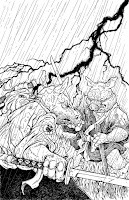 Inks:When the above layout was approved by the editor and Stan, I started the inks. First step was to print the layout file onto copy paper (over two sheets that had to be taped together at the seam) and tape that to the back of a sheet of Strathmore 300 bristol. On my Huion lightpad I was able to ink the cover art using the printout as my pencils lines. This way in the end the inked artwork is very crisp and clean with no need to erase pencils lines. I used Copic Multiliner SP pens to ink the art (the 0.7 and 0.3 nibs).
Inks:When the above layout was approved by the editor and Stan, I started the inks. First step was to print the layout file onto copy paper (over two sheets that had to be taped together at the seam) and tape that to the back of a sheet of Strathmore 300 bristol. On my Huion lightpad I was able to ink the cover art using the printout as my pencils lines. This way in the end the inked artwork is very crisp and clean with no need to erase pencils lines. I used Copic Multiliner SP pens to ink the art (the 0.7 and 0.3 nibs).The character inks went relatively quickly other than the hatching on Gen's pants and Zato's robe. While I did ink the lightning with the characters, I flipped over the bristol and inked the rain on the backside of the art. Using a lightbox I was able to see through to the front and make sure I wasn't placing a raindrop through a character's eye and to get the rain dripping off character's faces to follow the right contour. The image on the left digitally simulates what it looks like to see the rain through the bristol on a light pad.
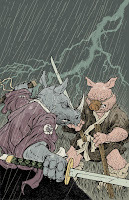 Color Flats:The inks were approved and I scanned them in to Photoshop to start the coloring process. This first part of coloring digitally is called 'flatting' and is a professional version of coloring inside the lines. Establishing what each area's color is and where it ends. This not only is a color base for the image, but also allows a quick flat color area to be able to quickly isolate to render or make adjustments on.
Color Flats:The inks were approved and I scanned them in to Photoshop to start the coloring process. This first part of coloring digitally is called 'flatting' and is a professional version of coloring inside the lines. Establishing what each area's color is and where it ends. This not only is a color base for the image, but also allows a quick flat color area to be able to quickly isolate to render or make adjustments on.Setting up the file by scanning the backside of the art to get the rain (which I then have to flip horizontally and align to the character art) and establishing all the color holds for the lightning and wet clothes took most of the time in this step, especially since I'd already established a color palette in my layout to pull from.
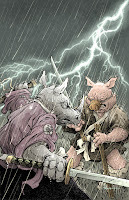 Final Colors:Here again is the finished art (this time sans-logo). To render all of the color I mostly used the Dodge and Burn tools (Photoshop tools based on real photography techniques for purposely over or under exposing film as it develops). Burn is do darken and Dodge is to lighten. I use a stock Photoshop textured brush as I add shadows and highlights with these tools so the work looks a little more organic and less digital.
Final Colors:Here again is the finished art (this time sans-logo). To render all of the color I mostly used the Dodge and Burn tools (Photoshop tools based on real photography techniques for purposely over or under exposing film as it develops). Burn is do darken and Dodge is to lighten. I use a stock Photoshop textured brush as I add shadows and highlights with these tools so the work looks a little more organic and less digital.It's an honor to be asked by Stan to do these covers and to get his approvals as I work through each cover.
Usagi Yojimbo: The Dragon Bellow Conspiracy #4 is out in stores September 29th
July 20, 2021
Gnome Pollinator
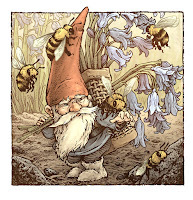 Last year when I had some inked commission slots open, a fan asked for a Gnome gathering flowers while interacting with the bees who were drawn to the smell of the pollen.
Last year when I had some inked commission slots open, a fan asked for a Gnome gathering flowers while interacting with the bees who were drawn to the smell of the pollen.I was thrilled to get to play in the world of Gnomes again. Years ago in 2017 I participated in a month-long draw challenge called Gnomevember (You can see the several posts about it here: http://davidpetersen.blogspot.com/search/label/Gnome)
Today's post is about the process of creating the art you see to the left.
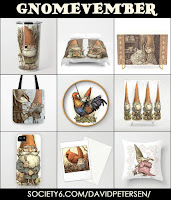
But, before we do, I wanted to let all of you know that you can purchase my Gnomevember art (including the piece I'm showing today) through my Society6 page:
https://society6.com/davidpetersen
There you can get framed prints, pillows, greeting cards, phone cases, totebags, coffee mugs, comforters, clocks, credenzas and more––all with my gnome art.
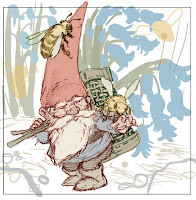 To start this Gnome commission, I drew out the gnome, basket, and bees all separately on copy paper. Then I scanned them into Photoshop to resize and assemble them into a single working composition. I tinted the gnome and the basket pencil art different colors to help me see them and make sense of which lines belonged to which objects.
To start this Gnome commission, I drew out the gnome, basket, and bees all separately on copy paper. Then I scanned them into Photoshop to resize and assemble them into a single working composition. I tinted the gnome and the basket pencil art different colors to help me see them and make sense of which lines belonged to which objects. I then did a quick digital color blocking of the forms I'd already drawn, as well as painting in the flowers, spots for a few more bees, and notes for the background. I printed out this digital workup to move on to the next stage.
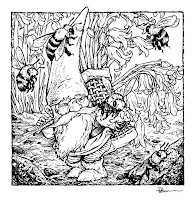
I physically inked the piece on a Hunion light pad. By taping the above printout to the back of a sheet of Strathmore 300 series bristol, I'm able to see the printout as a guide on the lightpad as I ink. For the inks themselves, I used Copic SP Multiliners (the 0.7 & 0.3 nibs mainly)
Some of the inking was tricky because I only had my rough digital painting to go by––and it's been long enough I don't remember if I did any additional penciling on things like the flowers or the bee on the rock, or if I just inked those with no guide.
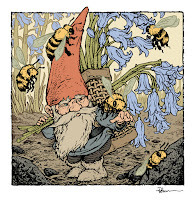
The fan who commissioned me was sent the original inks for the piece. But, before Julia shipped it off, I'd scanned the inks to do a digital color job for my own purposes.
The first step of which is to lay in flat color for each form. It's a professional version of color-in-the-lines. At this stage I also established all my color holds (areas where I want the inkwork to be a color other than black) like the wings of the bees or the background flowers.
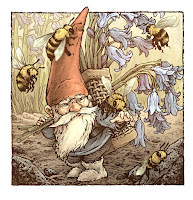 The last step was to do the final rendering of the colors. I used the Dodge and Burn tools in Photoshop to do this, adding highlights and shadows and texture where necessary to make the image feel complete.
The last step was to do the final rendering of the colors. I used the Dodge and Burn tools in Photoshop to do this, adding highlights and shadows and texture where necessary to make the image feel complete.As I said above, this piece is available as a print (and several other forms) on my Society 6 Gnome page:
https://society6.com/davidpetersen
July 13, 2021
Owlhen Caregiver 'Bilbin' Papercraft
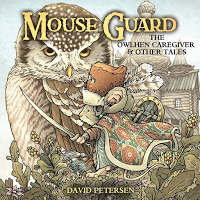 With the special one-shot issue Mouse Guard: The Owlhen Caregiver coming out tomorrow I've created a new papercraft mouse called 'Bilbin'.
With the special one-shot issue Mouse Guard: The Owlhen Caregiver coming out tomorrow I've created a new papercraft mouse called 'Bilbin'.It's a free download from my website so that you and your friends & family can print out and craft together your own Owlhen Caregiver (as well as several other Guardmice):
http://www.mouseguard.net/downloads/crafts/
Below you can see photos of the figure who appears in tomorrow's issue as well as influenced by the artwork of golden age illustrator Ivan Bilbin.
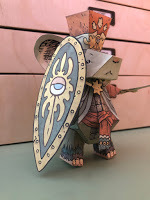
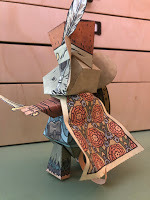
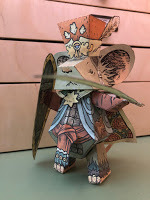
http://www.mouseguard.net/wp-content/uploads/2019/01/Delvinpapertoy.pdf
David Petersen's Blog
- David Petersen's profile
- 339 followers



